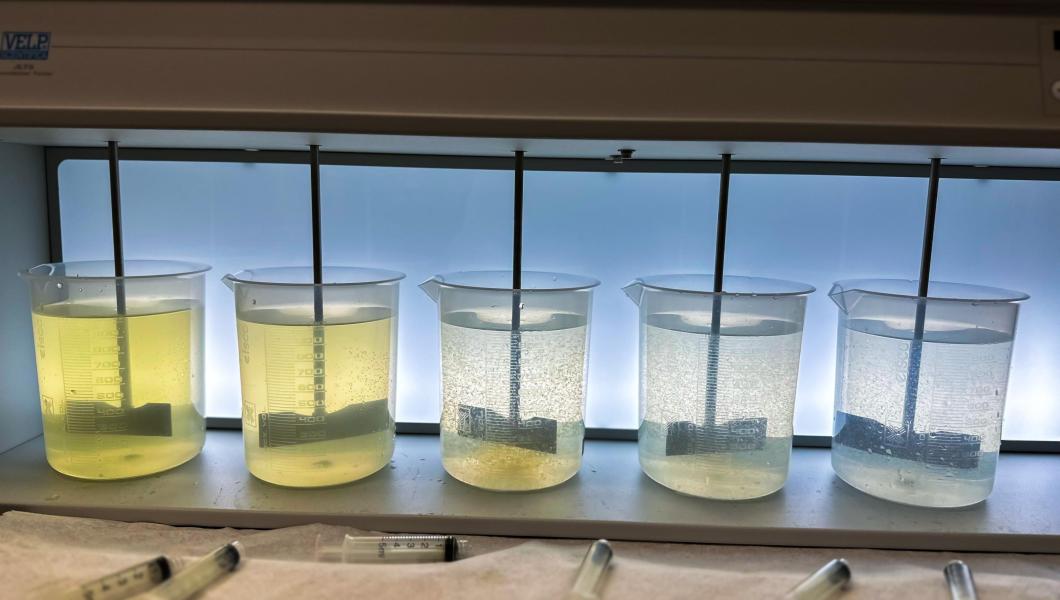US DOE Funds NJIT/BASF 'Opportunistic Retrofitting' Sustainability Project
A partnership between NJIT’s Center for Building Knowledge and BASF’s Center for Building Excellence to develop sustainable home retrofit materials continues to bear fruit. Their project, “Renew-Wall,” is one of 44 across 20 states that will share an $82.6 million round of funding from the U.S. Department of Energy (DOE) for projects aimed at reducing energy consumption in buildings and energy demand overall.
Ways to reduce energy consumption are numerous. Other grant recipients are developing novel absorption material to store thermal energy and energy-efficient air conditioning and supermarket refrigerators.
NJIT’s Center for Building Knowledge is focused squarely on traditional home retrofits such as re-siding jobs and window replacements, of which there are an estimated 1 million per year. American buildings account for more than a third of carbon emissions released each year and consume 40% of the country’s energy and 75% of its electricity.
Very few perform home retrofits purely for the sake of energy efficiency. They do it because their siding and windows are old, and they decide what materials to use largely based on cost. Because the typical home is retrofitted only once every 25 years, seizing the opportunity is crucial.
“The idea is to push towards market transformation. Field research validates these products and systems and brings them to market.” - Deane Evans
“The way to tackle issues of energy at scale in the U.S. is to do opportunistic retrofitting,” said Deane Evans, executive director of the Center for Building Knowledge at the Hillier College of Architecture and Design. “We’re taking something the homeowner is doing anyway and optimizing it for energy efficiency. What we’re trying to test is how much improvement you get taking that approach.”
We have the technology
The sustainable technology space is full of great ideas that are born out and validated by research. When it comes time to bring an idea to market, resources are often lacking, making the end product too expensive for large-scale adoption. It’s why a research university, the federal government, and private companies are working together.
“What we’ve been trying to focus on since we began is not just lab research, but off the shelf products that can be tweaked a bit,” said Christine Liaukus, Housing and Community Development program manager at the Center for Building Knowledge. “The idea is to push towards market transformation. Field research validates these products and brings them to market.”
BASF specially developed an exterior insulation for an earlier iteration of the project, called “Re-Side Right,” which is testing the performance of the 1” exterior insulation to reduce home air leakage and increase thermal resistance. The BASF/NJIT team is facilitating retrofits on 10 houses with promising results to date, including a reduction in modeled energy use and infiltration. One EPA study showed 25% to 40% of money spent on heating and cooling can be lost to infiltration. The Renew-Wall project takes ReSide Right to the next level by beefing up the insulation to 2 inches and incorporating high performance storm windows.
BASF’s relationship with NJIT goes back four years when the Re-Side Right project started taking shape. The company’s Center for Building Excellence provides technical expertise on high R-value (an insulating material’s resistance to conductive heat flow measured or rated in terms of its thermal resistance), and air/water-resistive barrier wall systems and insulation.
Meanwhile, NJIT is working with Alpen High Performance Products, a glass and windows manufacturer, to redesign their external storm window. For those windows, BRINC Building Products will supply a thermal bucka kind of foam that will provide an insulated surround for the storm window to reduce thermal bridging.
“The nice thing about both companies is that they’re known and successful, but small enough to be nimble,” said Liaukus. “They have the opportunity to prototype something that will work.”
“We share a common goal, and that is to engage in the research, selection and installation of products for new and retrofit construction applications with the intent to help consumers improve their home and/or building energy efficiency,” said Luis Espada, business manager at BASF. “We are very enthusiastic about the opportunity to continue working with NJIT CBK, and we hope to not only help improve the new building material system solutions but ultimately help consumers cut energy bills by improving energy efficiency.”

